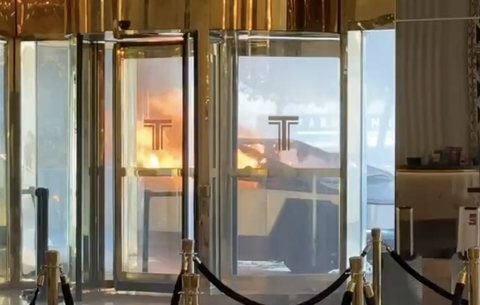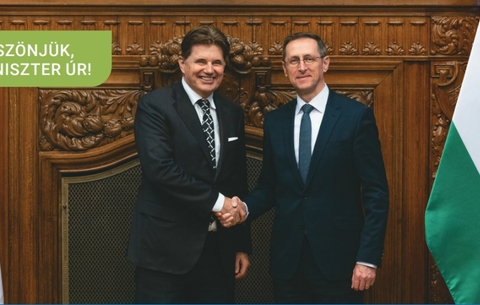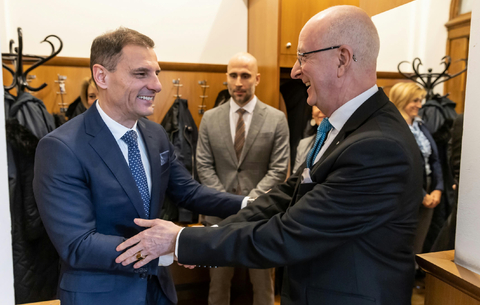Csaba László
The Visegrád four have no budget strategy, which is why they rejected Tony Blair's proposals, rather than giving them their serious consideration. Hungary does not know what it wants to achieve with its National Development Plan, according to the CEU professor.
hvg.hu: Why was agreement with the British prime minister so important?
László: The Visegrád countries - the Czech Republic, Hungary, Poland and Slovakia - have a peculiar shared position. They have a common interest, for example in making sure regional development money goes to the new member states and in preserving agricultural subsidies and the solidarity principle. We're seeing an emerging practice in the EU of the big countries - France, Germany, the UK and Italy - sitting down and agreeing on a course of action, and then the others can give their consent. So it's important for mid-sized countries to give voice to their desires. A common Visegrád Four position would go some way towards achieving this.
hvg.hu: But no agreement was reached in Budapest.
We missed an opportunity to put an end to the two-year-old running battle over the budget. The Visegrád countries should have discussed Tony Blair's proposals seriously in Budapest. He suggested that subsidies should be smaller in the 2007-13 budget, but that they should be accessible in a less bureaucratic way. Almost the whole of the Hungarian media presented this as a straightforward subsidy cut. But to me it seems highly unfortunate if you have a budget but only spend 15 per cent of it, as Hungarians have done over the past decade and a half with the subsidies available to small and medium enterprises. It's a continuous problem in the EU: there are vast sums available, but nobody uses them up. At the same time, other sources of EU finance are exhausted instantly. We're always hearing that people can only get a fraction of the money their entitled to, because the EU defends itself with bureaucracy. We should have taken Tony Blair's idea of cutting the application bureaucracy down to size very seriously. But the Visegrád countries didn't do this, even though it was a serious proposal.
Would you have accepted Blair's offer?
I'd have taken it as a starting point for negotiations. I'd have asked them to explain exactly administrative burdens would be lifted. The British would not have been able to come up with anything concrete, but at least we'd have known what was up for discussion in the next rotating presidency. But it doesn't work if they make an offer, and we say "nyet" whilst making our own demands. That's not a strategy. The biggest problem is that we're confusing promises of money with the real thing. It's not just the British - none of the other net contributors have put their money into the common kitty yet. The annual budget has yet to be approved, and then applications have to be written, bids have to be won, then the planned investment has to be set up, and it's only then that the money arrives. Quarrelling over distant and uncertain sources of money just ruins the atmosphere - it testifies to short-sightedness and the lack of a strategy. That's a problem, because Hungary will remain a member of the EU, and it's important that we don't end up like the Greeks, whom nobody takes seriously.
Elections are coming. Do you see any chance of a Hungarian strategy emerging?
Working out a strategy should be in the interest of both big parties. But I don't see much sign of that happening in coming months. We really need to think in 10-13 year timespans. We have to focus on competitiveness, on improving the education system, on regional development, on bringing in private-sector investment. The state should have a coordinating role, it shouldn't focus on concrete investment plans. But we just get confused talk, with no agreement on where we want to go. Management studies has the "vision, strategy, project, realisation" system. But we're always busy with realisation. But without the first three stages, then we're just like a hamster in a wheel: we never notice that we're going nowhere. We have to think more seriously about our interests, our future and about what we want from the EU. We'll only get somewhere if we think strategically.
László: The Visegrád countries - the Czech Republic, Hungary, Poland and Slovakia - have a peculiar shared position. They have a common interest, for example in making sure regional development money goes to the new member states and in preserving agricultural subsidies and the solidarity principle. We're seeing an emerging practice in the EU of the big countries - France, Germany, the UK and Italy - sitting down and agreeing on a course of action, and then the others can give their consent. So it's important for mid-sized countries to give voice to their desires. A common Visegrád Four position would go some way towards achieving this.
hvg.hu: But no agreement was reached in Budapest.
We missed an opportunity to put an end to the two-year-old running battle over the budget. The Visegrád countries should have discussed Tony Blair's proposals seriously in Budapest. He suggested that subsidies should be smaller in the 2007-13 budget, but that they should be accessible in a less bureaucratic way. Almost the whole of the Hungarian media presented this as a straightforward subsidy cut. But to me it seems highly unfortunate if you have a budget but only spend 15 per cent of it, as Hungarians have done over the past decade and a half with the subsidies available to small and medium enterprises. It's a continuous problem in the EU: there are vast sums available, but nobody uses them up. At the same time, other sources of EU finance are exhausted instantly. We're always hearing that people can only get a fraction of the money their entitled to, because the EU defends itself with bureaucracy. We should have taken Tony Blair's idea of cutting the application bureaucracy down to size very seriously. But the Visegrád countries didn't do this, even though it was a serious proposal.
Would you have accepted Blair's offer?
I'd have taken it as a starting point for negotiations. I'd have asked them to explain exactly administrative burdens would be lifted. The British would not have been able to come up with anything concrete, but at least we'd have known what was up for discussion in the next rotating presidency. But it doesn't work if they make an offer, and we say "nyet" whilst making our own demands. That's not a strategy. The biggest problem is that we're confusing promises of money with the real thing. It's not just the British - none of the other net contributors have put their money into the common kitty yet. The annual budget has yet to be approved, and then applications have to be written, bids have to be won, then the planned investment has to be set up, and it's only then that the money arrives. Quarrelling over distant and uncertain sources of money just ruins the atmosphere - it testifies to short-sightedness and the lack of a strategy. That's a problem, because Hungary will remain a member of the EU, and it's important that we don't end up like the Greeks, whom nobody takes seriously.
Elections are coming. Do you see any chance of a Hungarian strategy emerging?
Working out a strategy should be in the interest of both big parties. But I don't see much sign of that happening in coming months. We really need to think in 10-13 year timespans. We have to focus on competitiveness, on improving the education system, on regional development, on bringing in private-sector investment. The state should have a coordinating role, it shouldn't focus on concrete investment plans. But we just get confused talk, with no agreement on where we want to go. Management studies has the "vision, strategy, project, realisation" system. But we're always busy with realisation. But without the first three stages, then we're just like a hamster in a wheel: we never notice that we're going nowhere. We have to think more seriously about our interests, our future and about what we want from the EU. We'll only get somewhere if we think strategically.
English version
hvg.hu
2005. december. 02. 16:13
The millionaire philanthropist
English version
hvg.hu
2005. december. 05. 10:46
Median poll
English version
hvg.hu
2005. december. 02. 16:35
On mission
English version
hvg.hu
2005. december. 02. 16:21
Photocopiers in 1980s Hungary
English version
hvg.hu
2005. december. 02. 16:24
Bearers of truth
English version
hvg.hu
2005. december. 05. 10:52









